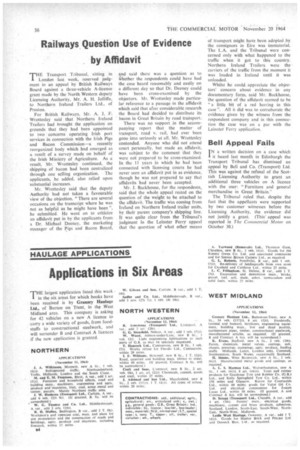Railways Question Use of Evidence by Affidavit
Page 38

If you've noticed an error in this article please click here to report it so we can fix it.
THE Transport Tribunal, sitting in London last week, reserved judgment in an appeal by British Railways Board against a three-vehicle A-licence grant made by the North Western deputy Licensing Authority. Mr. A. H. Jolliffe. to Northern Ireland Trailers Ltd., of Preston. For British Railways, Mr. A. J. F. Wrottesley said that Northern Ireland Trailers had brought the application on grounds that they had been appointed to two concerns operating Irish port services in connection with the Irish Pigs and Bacon Commission—a recently reorganized body which had emerged as a result of a survey made on behalf of the Irish Ministry of Agriculture. As a result, Mr. Wrottesley continued, the shipping of bacon had been centralized through one selling organization. The applicants, he added, also relied upon substantial increases. Mr. Wrottesley said that the deputy Authority had not taken a favourable view of the objection. "There are several occasions on the transcript where he was not as helpful as he might have been he submitted. He went on to criticize an affidavit put in by the applicants from a Dr. Michael .Deeney, the marketing manager of the Pigs and Bacon Board, and said there was a question as to whether the respondents could have had the case heard reasonably and easily on a different day so that Dr. Deeney could have been cross-examined by the objectors. Mr. Wrottesley made particular reference to a passage in the affidavit which said that after considerable research the Board had decided to distribute its bacon in Great Britain by road transport. There was no support in the accompanying report that the matter of transport, road v. rail, had ever been gone into seriously at all. Mr. Wrottesley contended. Anyone who did not attend court personally, but made an affidavit, was subject to the comment that they were not prepared to be cross-examined. In the 11 years in which he had been connected with licensing courts he had never seen an affidavit put in as evidence. though he was not prepared to say that affidavits had never been accepted. Mr. J. Backhouse, for the respondents. said that the whole appeal rested on the question of the weight to be attached to the affidavit. The traffic Was coming from Ireland on Northern Ireland trailer units, by their parent company's shipping line. It was quite clear from the Tribunal's judgment in the Leinster Ferry appeal that the question of what other means of transport might have been adopted. by the consignors in Eire was immaterial. The L.A. and the Tribunal were concerned only with what happened to the traffic when it got to this country. Northern Ireland Trailers were the carriers of the traffic from the moment it was loaded in Ireland until it was unloaded. Whilst he could appreciate the objectors' concern about evidence in any documentary form, said Mr. Backhouse, the question of the affidavit seemed to be "a little bit of a red herring in this case". All it did was to corroborate the evidence given by the witness from the respondent company and in this connection the case was on a par with the Leinster Ferry application.
Bell ppeal Fails
I N a written decision on a case which it heard last month in Edinburgh the Transport Tribunal has dismissed an appeal by Bell and Co. (Transport) Ltd. This was against the refusal of the Scottish Licensing Authority to grant an additional three vehicles on A licence with the user: "Furniture and general merchandise in Great Britain." The Tribunal ruled that, despite the fact that the appellants were supported by two customer witnesses before the Licensing Authority, the evidence did not justify a grant. (This/ appeal was reported in The Commercial Motor on October 30.)




















































































































